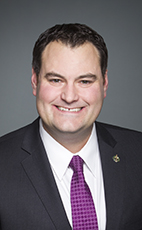Madam Speaker, it is a privilege to give my right of reply with regard to the debate that has taken place on my private member's bill, Bill C-311.
I want to thank all the members who participated in the debate on my private member's bill. I want to acknowledge the members of the Standing Committee on Veterans Affairs I have served with who have presented their points of view on this bill. I am so pleased to have worked with them on that committee to make sure that we are continuing to honour the service of those brave men and women who have served our country, past and present, and that we are doing the right things to honour their service.
I think we can all agree on the importance of Remembrance Day in Canada. We also share the desire to ensure that we are appropriately honouring those brave Canadians in uniform who have made the ultimate sacrifice for our country.
My bill is a modest measure that seeks to change the language in the Holidays Act to make Remembrance Day a legal holiday and to ensure that consistency of language is reflected in the act. This bill would ensure consistency with both Canada Day and Victoria Day in the Holidays Act and would elevate the status of Remembrance Day to put it on an equal footing with those other days.
Some have expressed that this provision would do more than that. Let me be clear that my bill, by adding the word “legal”, would not impact the Canada Labour Code, which establishes the policy on non-working days for holidays. Federally speaking, the day is already and will remain a federal paid non-working day.
Furthermore, and I want to be very clear on this point, it is up to each province and territory to determine whether Remembrance Day on November 11 is a statutory holiday or a day off in their jurisdiction. This is what determines whether there is no school and whether it is a public paid non-working day.
This bill does not and cannot make Remembrance Day a national holiday, because it is not within the purview of Parliament to do so. I am hoping that this bill may provide an occasion for the provinces and territories that do not already do so to determine whether Remembrance Day should indeed be a statutory holiday.
I note that some of my colleagues in the debate have mentioned that the bill would not make it a statutory holiday, and it cannot, but what it can do is elevate the day, put it on an equal footing, and hopefully provide an occasion for those jurisdictions that do not already do so to allow it to be a statutory day.
There are examples of other jurisdictions that do not mark the day as a so-called statutory holiday, but they mark the solemn occasion in other ways. For example, in my home province of Nova Scotia, it is separate from other statutory holidays, but it is kept in force under the Remembrance Day Act to ensure that people have time off to attend ceremonies. I would like to see this across the country, but of course, our Constitution requires that we respect the jurisdiction of provinces in this regard.
I want to address one issue that has been brought up by some who oppose the bill, which is the argument that students should be in school on November 11 to ensure that they are marking the day and reflecting on what November 11 at 11 a.m. means for our country. I respect their point of view. However, in my experience in Nova Scotia, and I believe in most places in Canada, it is far more meaningful for the students to learn the importance of Remembrance Day and the sacrifices of our forces in the days leading up to November 11.
Veterans come into the schools during Veterans' Week, and in addition to the teaching, there is also a remembrance service in schools, which veterans attend. Of course, if these were marked on November 11 at 11 a.m., veterans marking the occasion with the community could not attend those school services. However, if students had time off, they could mark November 11 in the community with veterans at their public ceremonies. We have seen increasing attendance, including by children and their families, in Nova Scotia.
I believe that all Canadians should be able to have the same experience and that all veterans should have the opportunity to be publicly appreciated for their service and remembered on November 11 at a collective experience with the whole community.
As I mentioned in my speech to begin this debate, proposed subsections 3(2) and 3(3) are not at all essential to my intent in raising the profile of Remembrance Day. Since I now recognize that those are problematic provisions, I support their removal at committee, and I will be asking the Standing Committee on Canadian Heritage for their removal if the bill is sent to it following a debate at second reading. We should therefore turn our minds to just proposed subsection 3(1) of this bill.
As my final words in this debate on Bill C-311, while the bill of course is about November 11, I am sure that we all agree that we must show respect to our veterans and members of Canadian Forces throughout the year and honour them in our words and our deeds.
As we come into the holiday season, let us keep them and their families top of mind and always show them extra kindness and warmth for all that they do for our country.

